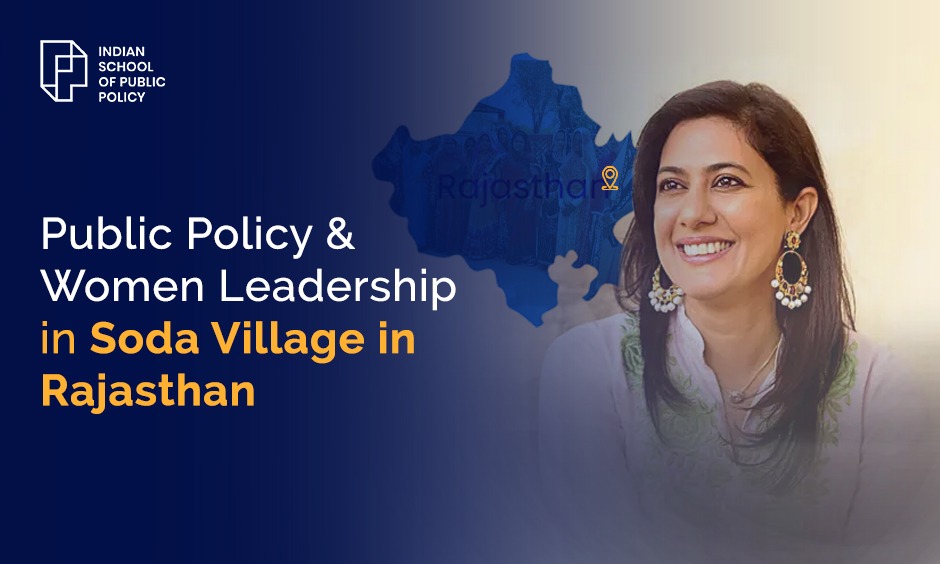Table of Contents
Defying Proxy Leadership: Chhavi Rajawat’s Public Policy Drive to Uplift Soda Village in Rajasthan

Rajasthan has long been associated with the phenomenon of pati-sarpanch – a practice where elected women sarpanches act as proxies for their husbands. Despite the provision for mandating one-third reservation for women in Panchayati Raj Institutions (PRIs) through the 73rd and 74th Amendments to the Constitution in 1992, later expanded to 50% in Rajasthan (The Rajasthan Panchayati Raj Amendment Act, 2008), the reality of women’s active participation in local governance remains weak.
Studies show that patriarchal constraints persist, often reducing women’s leadership to a symbolic presence. For instance, a 2015 survey in Sikar district (part of a study by Banasthali Vidyapith, Rajasthan) reported that nearly 70% of elected women representatives depended heavily on their husbands and sons for official decision-making, limiting the transformative potential of reservation. (Bhattacharyya, 2016).[1]
The severity of the issue led the Rajasthan government in 2020 to issue directives empowering district administration to suspend or remove individuals found violating the autonomy of elected women leaders, drawing authority from Article 38 of the Constitution, which obliges the state to minimize inequalities and promote welfare. Yet, enforcement remains a challenge. The persistence of proxy leadership demonstrates deep-rooted gender biases in rural governance.
Chhavi Rajawat: Breaking the Cycle of Proxy Leadership
Amidst these constraints, however, some women leaders have defied norms and exercised genuine authority. A notable example is Chhavi Rajawat, the MBA-educated former sarpanch of Soda village in Tonk district. Born into a farming family, Rajawat received higher education at Rishi Valley School and Lady Shri Ram College, later completing her MBA from Pune. She went on to work in corporate roles before returning to her village.
Her entry into politics was prompted by a crisis: in 2010, Soda was declared drought-affected, and its groundwater unsafe even for irrigation. The panchayat lacked funds to desilt its only reservoir. Villagers approached Rajawat for help, recalling her grandfather who had earlier served as sarpanch. Motivated by their appeal, she contested the elections and had two consecutive terms during 2010-2015 and 2015-2020, demonstrating that her leadership transcended symbolic representation.[2]
Driving Development through Public Policy and Participation
Chhavi has been instrumental in implementing several projects for the village successfully such as rainwater harvesting and providing toilet facilities in most homes. She has also organized many skill development workshops for women, which ranged from tailoring and handicrafts to digital literacy, thus making them financially independent.
She was honoured with the First Ladies National Award by the former President of India, Shri Ram Nath Kovind in 2018 for her exceptional contributions as the Sarpanch of Soda village in Rajasthan.
Chhavi has given keynote speeches to many people at several conferences organised by the Government, non-profits, businesses and universities.
Transformative Impact through Grassroots Governance
Through her initiative under rainwater harvesting in Soda she mobilized labour under the Mahatma Gandhi National Rural Employment Guarantee Act (MGNREGA), and villagers reclaimed 12 acres of reservoir land, which soon filled with rainwater, ensuring safe drinking and irrigation water.
Her administration also prioritized sanitation, school infrastructure for girls, and road connectivity – sectors often neglected in male-dominated panchayat planning.
A Model for Empowered Rural Leadership
Rajawat’s case illustrates the potential of empowered women sarpanches to move beyond proxy politics. While systemic barriers – patriarchy, weak enforcement, and limited resources – continue to restrict most women leaders, her story is different and shows how education, professional experience, and community mobilization can create transformative governance at the grassroots.



